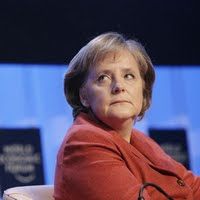BONN, Germany -- Since the conservative Free Democratic Party's (FDP) surprisingly strong showing in September elections here, German Chancellor Angela Merkel and her Christian Democratic Union (CDU) have taken a sharp turn to the right, pulled toward more fiscally conservative policies by FDP leader and foreign minister, Guido Westerwelle.
Since the FDP and CDU formally became a coalition in October, tax breaks have been given to big business, little action has been taken against banks viewed by many here as the main culprits of the financial crisis, and threats of cuts in social services loom. While the business community has praised the measures, a wellspring of populist anger has been on the rise in the electorate.
The pragmatic Merkel, who was often accused of leaning too far to the left in her previous coalition with the Social Democratic Party (SPD), is now being accused by political commentators of swaying too far to the right. They claim that the FDP, which won less than 15 percent of the vote, is hijacking her agenda and the agenda of the CDU, which won nearly 35 percent of the vote.

